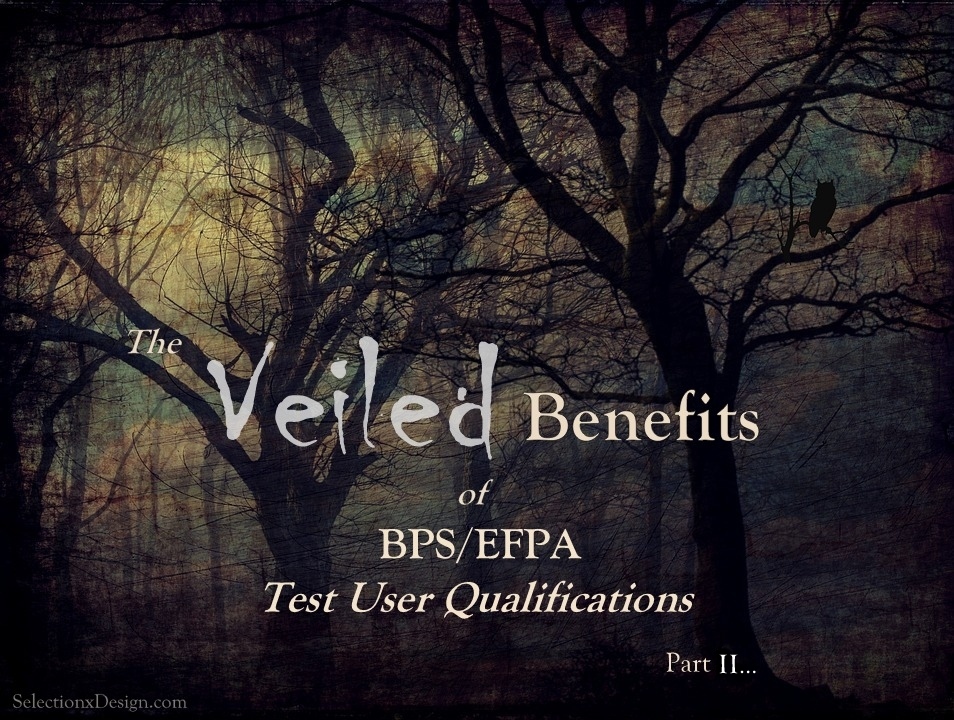Selection by Design’s Test User Personality training leads to specialization in the 16pf®. This is a well-known, defining feature of the course. Our trainees learn to score, interpret and use this test to assist with talent management, employee development and career decisions.
Just as with our Test User Ability training, though, there are gains in knowledge and skills—benefits—that aren’t always obvious. This second in our two part series on the lesser known benefits of obtaining the BPS/EFPA Test User qualifications focuses on Test User Personality training.
-
Perspective on personality stability and change: Implications for testing
Academic and clinical approaches to explaining personality vary in their views on whether personality remains constant from an early age, or dynamically evolves over the course of life. In the Test User Personality course, we look closely at these perspectives and consider the implications of stability vs. change for predicting behaviour. Deciding how to use the results of personality tests in work decisions depends on which viewpoint is taken. Stability implies that the person hired today can be expected to retain their valued characteristics throughout their tenure. This means that identifying candidates’ personality traits can help in making good hiring decisions. If growth is possible, however, it makes sense to use personality testing in coaching, leadership and team development. For anyone working in these areas, understanding the potential nature and depth of change is essential.
-
Knowing when to use trait or type measures
Selection by Design trainees have the chance to work with and learn about trait and type personality measures. Type tests like the Myers-Briggs Type Indicator® classify persons as belonging to one of several categories. As an alternative, tests such as the 16pf® measure characteristics as falling on a continuum. This means that the strength of a trait is indicted. You can be slightly extraverted, for example, or definitely introverted. As another possibility, persons might fall in the middle and behave as either introverts or extraverts depending on the situation.
Traits scales offer more in-depth assessment than type scales. Trait scores may be justifiably included in selection decisions. Type categories may be effectively used in team building or career guidance. Understanding how these tests vary, and when to use each, ensures that the nature of test results suit their intended use.
-
How to apply psychology to testing and feedback
The content of the Test User Personality course draws upon the field of psychology when considering individual reactions to testing and result feedback. Knowing how candidates are likely to react to being tested and to feedback on their test scores is an asset when preparing to test. Anticipating and addressing potential problems means a smooth-running testing campaign. Here are a couple of examples of how psychology can be applied to testing:
Example 1. Taking a test: “I’ll make a great impression!” Socially, persons present themselves to make a positive impression on others. Similar efforts may influence responses to personality test questions. Learning about the kinds of biases that may affect test responses, how to detect these and how to prevent them from having an impact is necessary for an accurate interpretation of results.
The 16pf® includes scales and statistics that can be used to detect forms of self-presentation. Test User Personality trainees learn how to use these tools to see if candidates are honestly portraying themselves, and if they are not, how to deal with faking.
Example 2. Receiving feedback: “This is so me!” Adopting a phrase from PT Barnum, personality interpretations can offer “something for everyone.” We are all susceptible to believing vague information about ourselves if it is presented convincingly. Phenologists, tarot card readers and astrologers might take advantage of this, but what about Test Users?
An important part of feedback is verifying test results. This may be done by seeking confirming or disconfirming evidence from candidates with probing questions. Trainees practice using these methods to establish whether test scores really are what they seem to be. The Barnum effect can be avoided, as candidates are encouraged to question their apparent test scores. An accurate and realistic portrayal of personality results.
-
Advanced feedback skills
Being able to effectively draw together and communicate test results is a must-have skill for those working with psychometric measures. Test User Personality trainees gain this skill through extensive practice in both face-to-face and written feedback, for purposes of selection as well as personal development.
Trainees hone their feedback skills through working with the 16pf®. This test offers many options for evaluating trait and profile patterns. Interpreting and communicating its results can be both intriguing and challenging. Effective feedback requires knowing what information to share with candidates, and how to phrase it accurately, sensitively and appropriately. Learning to do this as part of a two-way communication process is key for effective feedback discussions to take place.
The high level of skill acquired through 16pf® feedback practice has both immediate and long-term benefits. In the short run, trainees emerge from the course ready to start incorporating the 16pf® in their work-related assessments. In the long term, experience in developing and providing feedback for such an in-depth measure effectively prepares trainees for future work with additional, complex personality tests.
If you missed Part I in this two part series on the Veiled Benefits of BPS/EFPA Test User Qualifications, you can find it here.
Have you benefited in other ways from our Test User training? We would love to hear about it in your comments below.
For those yet to complete these courses, last chances for 2017 are offered in November. Enrol soon to secure your place!


